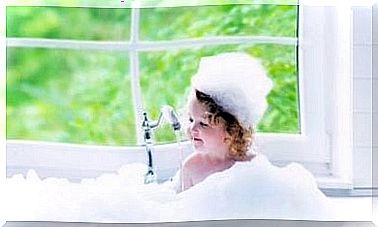Polite Children: 5 Tips For A Good Education

Raising educated children is a very important task of parents. Obviously, understanding and knowing how to use good manners will give the little one many advantages: education, courtesy and sympathy towards others.
Good manners give an attitude of appreciation towards oneself and the surrounding people. Their teaching must occur from early childhood, and must be daily.
In today’s modern society, raising educated children is essential. Undoubtedly one of the most important roles of the parent is to teach the child to develop social skills, to show him how to interact politely with others, to treat people with respect and consideration.
5 tips for raising educated children
Here are the tips to keep in mind when teaching education to your children.
1. Be a role model
The first essential tip for teaching children to be educated is to keep in mind that they tend to imitate their referent. For this you must conduct correct behavior so that your children imitate you.
Even when you speak, you must have a calm tone, and above all make requests without threatening the children. It is not always easy to be patient, but as an adult it is your responsibility to help them model correct behavior.

2. Sensitivity
Good manners derive from respect for the other, the course for respect is essentially sensitivity. If you can teach a child the value of this quality, you are giving him a wonderful gift.
The root of good manners is respect and the root of respect is sensitivity. Sensitivity is one of the most precious qualities you can teach children. A sensitive child cares about the feelings of others and naturally turns into an educated person.
3. “Please” and “thank you”
Teaching him to say “please” and “thank you” is the fundamental principle for raising educated children. This note is also essential for good manners. As the children grow up, parents can ask them to write thank-you notes, preferably with pen and paper.
Asking children to thank them for the gifts they receive is a very fine thought. But it is equally important to teach to thank the people who help and assist them every day, the waiters in the restaurant and especially the family when they help in everyday life.
4. Respect the turn to speak
Make sure your child knows how to respect his turn to speak. This is a very common problem among children, especially younger ones. It happens because children want to express their feelings and feel they have to do it as soon as they sense it.
Babies are naturally very self-centered, so it’s normal to have to remind them to wait their turn to talk, without interrupting the other. To help them acquire this habit, you can try using a visual reminder, such as a stuffed animal or a stick to indicate its turn.

5. Don’t force them into good manners
Language is a skill that must be exploited and not forced. While it is good to remind them to “please” to a request, it is not good to force them into situations.
In fact, you have to be careful: the child may get tired of using polite words even before he understands their meaning.
Likewise, when you remind them to ask “please”, you have to do it as a part of the speech, not as a requirement for getting what you want. In this way the child will acquire the word in his usual dictionary.
Finally, we remind you that it takes a lot of patience to raise educated children. Obviously this is something that needs to be taught on a daily basis before you can see the results. We are convinced, however, that time will not be badly spent.









